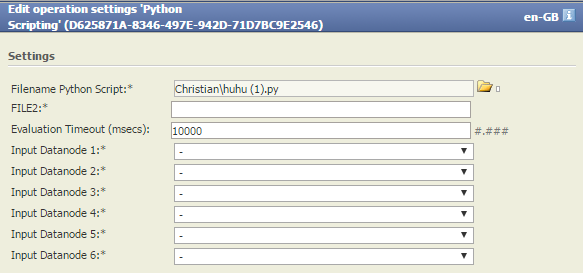Python Scripting
Summary
Applies a python script on input data. Additional input data nodes may be specified.
Example:
Situation | |
|---|---|
Settings |
|
Result | |
Project-File |
Simple Main
The simple_main method is available starting from version 6.0 of TIS. In older versions you need to provide a wrapper class. Write your code into the simple_main method.
class SimpleMain: # Wrapper for simple_main(params, sponge_list, types, columns). types = {} columns = {} def __init__(self, user_script, params, inp): self.user_script = user_script self.params = params self.inp = inp async def sponge(self): # Async generator that yields results from user_script. for res in self.user_script(self.params, [row async for row in self.inp], self.types, self.columns): yield res def get_types_columns(self): # Return pair of types and columns. return self.types, self.columnsdef simple_main(params, mylist, types, columns): # # do something # return mylist def main(params, inputs, outputs): inp, out = inputs[0], outputs[0] simple = SimpleMain(simple_main, params, inp) return [(simple.sponge(), out)], { inp: simple.get_types_columns, out: simple.get_types_columns }Want to learn more?
Settings
Deletes columns or ranges of columns from the data table.
Columns of input table
Troubleshooting
Problem | Frequent Cause | Solutions |
|---|---|---|
... | ... |
Sample Scripts
Sample Project
Input data structure
By convention the first 2 rows define the types and captions of the input columns.
def main(params,inputs,outputs): columns = {} types = {} async def getcolfilter(): nonlocal columns v = None while 1: v = yield v i0 = inputs[0] o0 = outputs[0] return [ (i0, getcolfilter(), o0) ], {i0: (lambda: (types, columns))} Refer to columns by Caption
Use nonlocal to refer to variables in the main method's scope in order to be available in another nested method, such as inc in this sample.
Note: gen.__anext__() will be replaced by anext(gen) in Version 3.7, see https://www.python.org/dev/peps/pep-0525/#aiter-and-anext-builtins
# one input, one output# duplicate input rows with row idsdef main(params,inputs,outputs): Birthday = None columns = {} types = {} async def getcolfilter(i): nonlocal Birthday nonlocal columns Birthday = columns['Birthday'] async for v in i: yield v async def inc(): nonlocal Birthday v = None while 1: v = yield v # produce v, then wait for next v v[Birthday] += datetime.timedelta(days=365) i0 = inputs[0] o0 = outputs[0] return [ (getcolfilter(i0), inc(), o0) ], {i0: (lambda: (types, columns))} Aggregate input into a list
Each yield internally calls asend then waits with anext.
Prime
Every generator must be initialized with a None, otherwise, following exception occurs:
await o.asend(v) File "user_script.py", line 18, in flush TypeError: can't send non-None value to a just-started async generator
# aggregates complete input into a list # flushes list to output def main(params, inputs, outputs): async def sponge(i): mylist = [] async for v in i: mylist.append(v) yield mylist async def flush(o): mylist = yield await o.asend(None) # prime o for v in mylist: await o.asend(v) i0 = inputs[0] o0 = outputs[0] return [ (sponge(i0), flush(o0)) ]Add a new column to output
Input has a date column named "Birthday".
An output row v is a list, so appending creates an additional column.
# input has a date column named 'Birthday'# add a new column 'age' to outputdef main(params,inputs,outputs): from datetime import date columns = {} types = {} async def getcolfilter(): nonlocal columns v = None while 1: v = yield v async def addage(): nonlocal columns, types types[len(columns)] = int columns['Age'] = len(columns) v = None while 1: v = yield v a = age(v[columns['Birthday']]) v.append(a) def age(birthday): today = date.today() age = (today.year - birthday.year - \ ((today.month, today.day) < (birthday.month, birthday.day))) return age i0 = inputs[0] o0 = outputs[0] return [ (i0, getcolfilter(), addage(), o0) ], {i0:(lambda: (types,columns)), o0:(lambda: (types,columns))}Related topics
- Starting to work with python for consultants

